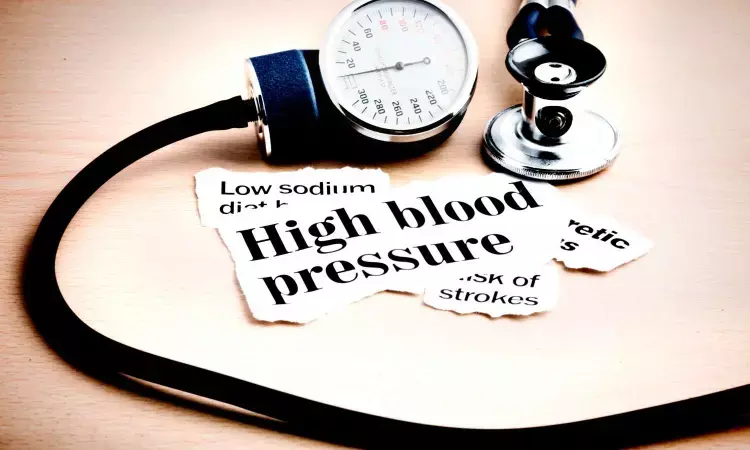- Home
- Medical news & Guidelines
- Anesthesiology
- Cardiology and CTVS
- Critical Care
- Dentistry
- Dermatology
- Diabetes and Endocrinology
- ENT
- Gastroenterology
- Medicine
- Nephrology
- Neurology
- Obstretics-Gynaecology
- Oncology
- Ophthalmology
- Orthopaedics
- Pediatrics-Neonatology
- Psychiatry
- Pulmonology
- Radiology
- Surgery
- Urology
- Laboratory Medicine
- Diet
- Nursing
- Paramedical
- Physiotherapy
- Health news
- Fact Check
- Bone Health Fact Check
- Brain Health Fact Check
- Cancer Related Fact Check
- Child Care Fact Check
- Dental and oral health fact check
- Diabetes and metabolic health fact check
- Diet and Nutrition Fact Check
- Eye and ENT Care Fact Check
- Fitness fact check
- Gut health fact check
- Heart health fact check
- Kidney health fact check
- Medical education fact check
- Men's health fact check
- Respiratory fact check
- Skin and hair care fact check
- Vaccine and Immunization fact check
- Women's health fact check
- AYUSH
- State News
- Andaman and Nicobar Islands
- Andhra Pradesh
- Arunachal Pradesh
- Assam
- Bihar
- Chandigarh
- Chattisgarh
- Dadra and Nagar Haveli
- Daman and Diu
- Delhi
- Goa
- Gujarat
- Haryana
- Himachal Pradesh
- Jammu & Kashmir
- Jharkhand
- Karnataka
- Kerala
- Ladakh
- Lakshadweep
- Madhya Pradesh
- Maharashtra
- Manipur
- Meghalaya
- Mizoram
- Nagaland
- Odisha
- Puducherry
- Punjab
- Rajasthan
- Sikkim
- Tamil Nadu
- Telangana
- Tripura
- Uttar Pradesh
- Uttrakhand
- West Bengal
- Medical Education
- Industry
Systolic blood pressure high during winter compared to summer months, finds study

USA: An analysis of electronic health records for more than 60,000 adults in the United States found that systolic, or top-number, blood pressure rose slightly during the winter compared to summer months. The health records were of adults being treated for high blood pressure from 2018 to 2023 at six health care centers of varying sizes located in the southeast and midwestern United States.
Blood pressure among patients diagnosed with hypertension appeared to slightly increase and rates of systolic, or top number, blood pressure being controlled during an outpatient visit appeared to slightly decrease during winter months, according to a new study to be presented at the American Heart Association’s Hypertension Scientific Sessions 2023, held Sept. 7-10, 2023, in Boston. The meeting is the premier scientific exchange focused on recent advances in basic and clinical research on high blood pressure and its relationship to cardiac and kidney disease, stroke, obesity and genetics.
According to the American Heart Association’s 2023 Statistical Update, nearly half of adults in the U.S. have high blood pressure. Previous research found that blood pressure varies with the seasons of the year. Most of this variation is in systolic blood pressure-the top number in a blood pressure reading that gauges the pressure in/against blood vessels during heartbeats. The study authors sought to understand whether blood pressure control, defined in this study as less than 140/90 mm Hg among patients with hypertension, varied by season.
“Despite the smaller degree of systolic blood pressure variation in comparison to previous studies on seasonality in blood pressure, we were surprised to observe a large degree of change in blood pressure control between winter and summer months,” said lead study author Robert B. Barrett, a software engineer at the American Medical Association in Greenville, South Carolina. “Individuals with hypertension or values near the range of hypertension may benefit from periodic blood pressure monitoring and improvements in physical activity and nutritional patterns during winter months to offset adverse effects from seasonal blood pressure changes.”
The researchers reviewed electronic health records for 60,676 adults treated for hypertension between July 2018 and June 2023 at six health care centers. Each participant remained on their originally prescribed classes of antihypertensive drugs throughout the review period. Primarily in the Southeast and Midwest regions, the centers ranged from small federally funded nonprofit health centers or clinics to large academic medical centers. Seasonal blood pressure readings were analyzed to assess variations in blood pressure control during the winter vs. summer months (December through February vs. June through August, respectively) as part of an American Medical Association-supported, quality-improvement program for clinicians and health care centers. Study participants were an average age of 62 years old; 52.3% identified as white race; 59.7% identified as female.
The analysis of the health records found that, on average, participants’ systolic blood pressure increased by up to 1.7 mm Hg in the winter months compared to the summer months. In addition, they found that blood pressure control rates decreased by up to 5% during the winter months.
Future directions for investigation might include analyzing the frequency of heart disease and deaths during each season, the authors noted.
The study’s limitations include that the electronic health records did not capture a complete health history for each participant and that information collected for each patient was retrieved only from the institution where they were treated.
Background:
The 2017 ACC/AHA Guideline for the Prevention, Detection, Evaluation, and Management of High Blood Pressure in Adults classifies hypertension as having top and bottom numbers greater than or equal to 130/80 mm Hg. This study defined hypertension as numbers greater than or equal to 140/90 mm Hg.
Reference:
Cold weather may pose challenges to treating high blood pressure, American Heart Association, Meeting: AHA Hypertension Scientific Sessions 2023
Dr Kamal Kant Kohli-MBBS, DTCD- a chest specialist with more than 30 years of practice and a flair for writing clinical articles, Dr Kamal Kant Kohli joined Medical Dialogues as a Chief Editor of Medical News. Besides writing articles, as an editor, he proofreads and verifies all the medical content published on Medical Dialogues including those coming from journals, studies,medical conferences,guidelines etc. Email: drkohli@medicaldialogues.in. Contact no. 011-43720751


